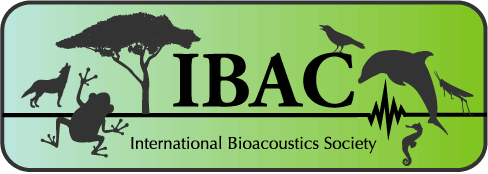top of page
The Confernce

THE CONFERENCE
The African Bioacoustics Community hosts a biennial conference that brings together individuals from around the world interested in bioacoustics.
These conferences provide opportunities for underrepresented scientists based in Africa to present their research, learn from some of the best in the field, and network with other researchers working on bioacoustic projects in Africa.
THE 4TH AFRICAN BIOACOUSTICS COMMUNITY CONFERENCE
1ST - 6TH SEPTEMBER 2024
The Breakwater Lodge, Cape Town, South Africa

We are very happy to announce that the 2024 ABC conference will be a HYBRID event! This means you will be able to attend the conference in person and online.
Registration Fees for ABC 2024
All fee conversions were accurate at the time of printing
In Person Fees
Early Bird Rates (valid to the 31st of May 2024)
Student (low income)
Student (high income)
Standard (low income/unwaged)
Standard (high income/waged)
Workshops
ZAR
4950
5950
6500
7500
900
USD
265
318
347
450
48
GBP
209
252
275
317
38
EUR
245
295
322
372
45
Online Fees
Student (low income)
Student (high income)
Standard (low income/unwaged)
Standard (high income/waged)
ZAR
1500
2000
2500
3000
USD
80
107
134
160
GBP
64
85
106
127
EUR
75
100
124
149
Standard Rates (valid from 1st June to 31st July 2024)
Student (low income)
Student (high income)
Standard (low income/unwaged)
Standard (high income/waged)
Workshops
ZAR
5445
6545
7150
8250
990
USD
290
350
382
400
53
GBP
230
277
302
348
42
EUR
270
324
354
409
49
Late Rates (valid from 1st August to 17th August 2024)
Student (low income)
Student (high income)
Standard (low income/unwaged)
Standard (high income/waged)
Workshops
ZAR
5940
7140
7800
9000
1200
USD
318
382
417
481
64
GBP
250
302
330
380
51
EUR
295
354
386
446
60
Exhibitor Stand Fees
ZAR
11500
USD
615
GBP
486
EUR
570
Our sponsors


The Community
The Community
Globally, bioacoustics is a rapidly growing field of research. However, despite access to a wide range of behaviourally interesting and vocal species, unique environments, and increasing development resulting in noise pollution, bioacoustic research in Africa and by African scientists is comparatively lagging.
Financial constraints limit the opportunities for African scientists to learn from and network with experts in the field through international conferences, workshops, courses etc.

It is with these realities in mind that the African Bioacoustics Community was initiated in March 2018. The African Bioacoustics Community aims to provide a networking forum for people working on all aspects of bio-acoustic research in Africa.
OUR ETHOS
Bioacoustic research from Africa and by African scientists is not well represented in the global field and thus the African Bioacoustics Community strives to shine a light on the achievements of bioacoustics research in Africa. We work towards equal representation, access to crucial learning and networking opportunities, and providing an environment where information flows freely between scientists, research labs, countries, and continents.
Sustainability and minimizing our carbon footprint is something we value highly and we work hard to ensure that our events are sustainable, plastic-free and carbon responsible. As part of our effort in this matter, we ask that members of our community consider carbon-offsetting measures or donating to a cause that aligns with our values.
Every action we take makes a difference.
Diversity and Inclusion are as necessary as ABC
The African Bioacoustics Community wants to make the science of sound accessible to the continent of Africa. We cannot achieve this without a diverse and inclusive mindset, valuing new ideas, and celebrating different approaches. We hope to foster connection and relationships between people who are passionate about the unique and fascinating field of bioacoustics.
After all, Community is in our name.
Our ultimate goal is to provide a socially and environmentally conscious place for researchers to network, to learn and to share their research in the field of bioacoustics.

For further information email us at:
africanbioacoustics@gmail.com
or follow our social media:
bottom of page









